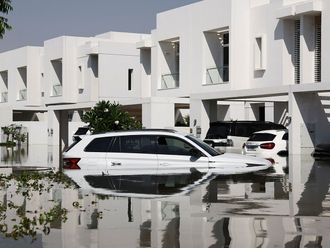
The oversupply of property in Dubai is already here, while Abu Dhabi continues to be a relatively tight market.
A search of the Property Finder real estate listings' website reveals that Dubai has 18,887 properties for sale and 11,366 available for rent. For Abu Dhabi, the market supply is much tighter, with 2,099 units for sale and 1,372 looking for tenants.
Going forward, market estimates for Dubai are for an additional 20,000 units to be added to this pool in 2010 and 2011. Abu Dhabi is building less real estate but there will be a significant increase in supply in certain categories such as high-end residential apartments.
Concentrations of vacant property are already evident in Dubai. Fancy an apartment on the iconic Palm Jumeirah? Well there are 1,394 to choose from, according to the website, and 439 with three or more bedrooms.
Or perhaps you want to buy an apartment in the Jumeirah Beach Residence facing the beach in the Dubai Marina district? Take your pick from the 713 properties listed.
It is amazing then that asking prices for properties in Dubai actually seem to have increased over the past six months, and even selling prices. This appears to have more to do with a global economic rebound, manifested in higher trade and tourism in Dubai, than the supply and demand dynamics of the local real estate sector. Indeed, the oversupply continues to increase by the day as developers proudly hand over completed units.
The Goldcrest Tower in Jumeirah Lakes Towers alone added another 500 units last month. Developer Damac Properties has even just placed a Dh500 million contract with Arabtec to build another 600-apartment tower in the Dubai Marina, claiming that by the time it is finished in two years, the demand will have returned.
This is a truly heroic assumption in the face of current existing oversupply in Dubai and the upcoming completions. Where are the new buyers and tenants going to come from?
Demand side
The UAE is now recovering from the local recession of 2009 but the most optimistic government estimates are for modest economic growth over the next couple of years. There will be some expansion of employment in tourism and aviation with new hotels and aircraft raising staff supply and accommodation needs.
Then again, nobody is expecting a sudden burst of growth in the global economy, outside perhaps of Asia where talk of overheating is already depressing local stock markets. In fact, Europe, including the UK, seems to be heading back into recession in a new age of austerity and that will not be good news for UAE tourism for which this is the biggest market.
Oil prices have slipped back over the past few weeks and if the downturn in global markets gains traction — with a double dip recession perfectly predictable as witnessed from other major financial crises in the past — then the UAE is going to be left knee-deep in unsold and un-let apartments, and to a lesser extent villas.
Further house price and rental reductions look inevitable in such an economic environment and the supply and demand situation will exaggerate this problem to the downside. But there will need to be a trigger to start this price correction process.
Step forward the repossessionauctions, due to begin very soon to allow developers to sell off-plan units where buyers have defaulted on their payments. The aim is to permit developers to raise funds to complete their projects. This is the final stage of clearing up the mess left by the Dubai off-plan sales collapse more than 18 months ago.
Unfortunately, repossession auctions are a double-whammy for house prices. First, auctions reset market prices at lower levels by matching prices with the true level of market demand. Secondly, if successful auctions allow developers to complete their projects, they will add to the oversupply of property and therefore depress prices.
Unless something happens very soon to ramp up oil prices to a level that revives the economic boom that formerly prevailed in the UAE — always a possibility as the current boom in China demonstrates — then a second day of reckoning seems to be dawning for the local real estate sector.
That will throw up some deals of a lifetime for buyers and tenants but will present a new challenge to developers and their bankers.
The writer is editor of the Arabian Money website












